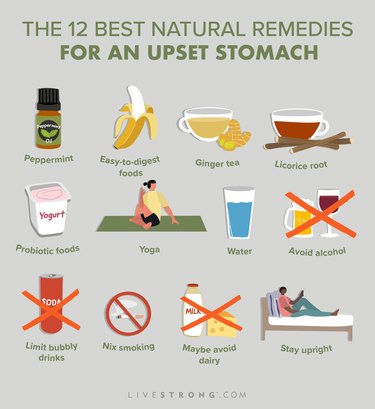

Just about everyone gets an upset stomach from time to time, and while it's usually nothing to be concerned about, it can be a real pain. Fortunately, there are a number of natural remedies for an upset stomach that may help.
But keep in mind that the term "upset stomach" can mean different things to different people, says Mark Epstein, MD, a board-certified gastroenterologist at Middlesex Digestive Health & Endoscopy Center in Acton, Massachusetts.
Video of the Day
Video of the Day
What Causes an Upset Stomach?
A variety of causes can lead to that feeling of an unsettled tummy, including, according to the Cleveland Clinic:
- Gas
- Bloating
- Acid reflux or indigestion
- Food allergies and intolerances
- Food poisoning
- Constipation
- Diarrhea
Plus, everyone's body is different. That's why you may want to try a few different remedies to see what works best for you.
Below are 12 home remedies for an upset stomach recommended by doctors, and four that you should probably skip.
1. Sniff Some Peppermint
"Peppermint relaxes the smooth muscle found in the gastrointestinal tract," Dr. Epstein says. "As such, it can be used effectively in the treatment of abdominal cramps."
One caveat, though: This relaxing effect could worsen symptoms of acid reflux, so steer clear if you're having symptoms like heartburn, chest pain or difficulty swallowing. (Try a few natural remedies for heartburn instead.)
The easiest way to get peppermint is by drinking peppermint tea, but you can also use peppermint oil as an aromatherapy treatment.
"Peppermint is especially potent in treating tummy aches," says Carrie Lam, MD, a primary care doctor at Lam Clinic in Tustin, California. "Just add a drop of the essential oil to a bowl of hot water and inhale the steam, or add a few drops to a cloth and either inhale periodically or place it on clothing where you can smell it."
Do Mints Help an Upset Stomach?
Research supports using peppermint for indigestion and irritable bowel syndrome (IBS), according to Mount Sinai, but the "mints" you buy at the deli or pharmacy only contain trace amounts of peppermint — if any at all — so try peppermint tea, peppermint oil or peppermint capsules instead.
2. Try a Version of the BRAT Diet
"The BRAT diet consists of bananas, rice, applesauce and toast," Dr. Epstein says.
Why can these foods help settle an upset stomach? They're typically easy to digest, he says, and are well-tolerated when someone has diarrhea or a stomach virus. (Note that rice in this case refers to white rice. While brown rice is usually a healthy choice, it's high in fiber and can be tough to digest, so you probably want to avoid it while you're having stomach troubles.)
Dr. Epstein usually suggests sticking to this diet for three to seven days in order to firm up your stools and give the gastrointestinal tract a chance to heal from your digestive issues.
Because these foods are low in protein and fat, though, you'll want to add in some lean proteins like chicken, turkey, fish and eggs. Just be sure to keep them plain, because higher-fat foods can make an upset stomach and diarrhea worse. Skip frying them in oil or butter and try baking or boiling instead. (Stay away from spicy foods until your stomach feels better, too.)
3. Drink Ginger Tea
Wondering what to drink to settle your stomach? "One of the most effective and natural stomachache remedies is ginger," Dr. Lam says. "Ginger calms the nervous system and stomach muscles, reduces nausea and promotes the secretion of saliva, which contains enzymes that help with digestion."
A January 2019 study in Food Science & Nutrition concluded consuming 1 gram of ginger daily relieved nausea symptoms in pregnant people. And a July 2012 study in Supportive Care in Cancer found 0.5 to 1 gram of ginger reduced nausea in people going through chemotherapy.
You can take ginger capsules or suck on ginger candies, but Dr. Lam suggests getting it in a tea.
"You can make your own pot of fresh ginger tea by grating some ginger, adding it to a cup of hot water, adding honey and letting it steep for 10 minutes," she says. "Then drink a sip or two every few minutes. If your body is more sensitive, you can steep it for five minutes and slowly increase thereafter."
Tip
Before you start guzzling ginger ale, check the ingredient list. Not all commercial ginger ales use a significant amount of the herb, which is why homemade ginger tea is a better herbal remedy for stomach discomfort.
4. Try Licorice
Licorice root has been used as a home remedy for upset stomach for centuries thanks to its antioxidant, anti-inflammatory and antimicrobial properties. While many consider this an old wives' tale, a small June 2011 study in Evidence-Based Complementary and Alternative Medicine found taking a 75-milligram licorice capsule twice daily for 30 days led to stomach pain relief in 50 adults.
You could try a supplement or licorice root tea, which is available in many grocery or health food stores. Or try making your own tea as a drink for upset stomachs by combining two tablespoons of licorice root powder with a cup of boiled water.
Warning
While licorice root is generally considered safe, large amounts of it have been linked to serious side effects including increased blood pressure, decreased potassium levels and premature birth, according to the National Center for Complementary and Integrative Health. If you're pregnant or breastfeeding, have high blood pressure or have heart or kidney disease, talk to your doctor before trying licorice root.
5. Eat Foods With Probiotics
Probiotic-rich foods can benefit several gastrointestinal issues, including easing constipation and preventing diarrhea, according to the National Center for Complementary and Integrative Health.
Some common probiotic foods include:
- Yogurt
- Kefir
- Sauerkraut
- Kimchi
- Kombucha
- Tempeh
- Miso
Probiotics "help in balancing gut flora, naturally bringing about a stronger and healthier digestive system altogether," Dr. Lam says. "They also relieve diarrhea, gas, bloating and indigestion."
6. Do Some Yoga
Some research has shown practicing yoga can help ease digestion. A December 2016 study in Clinical Gastroenterology and Hepatology found doing yoga decreased bowel symptoms and anxiety in 273 people with IBS. And another December 2016 study in the International Journal of Environmental Research and Public Health found yoga decreased abdominal cramps and bloating in people with premenstrual symptoms.
What's more, a 2013 paper in the International Journal of Yoga suggests yoga may also affect stomachaches by helping you to destress, which can in turn improve digestion.
Here are some good yoga poses for stomachaches:
Seated Spinal Twist
- Start sitting on a mat with your knees bent in front of you.
- Place your left knee on the ground so your left foot is close to your right glute.
- Bend your right knee and place your right foot over your left thigh so the sole of your right foot is flat on the ground.
- Take a deep twist to the right, placing your left elbow against your right knee for support.
- Repeat on the other side.
Reclined Wind Relieving
- Lie down on your back on a mat.
- Bring your knees into your chest and hug your arms around your shins.
- Breathe into your abdomen as you pull your legs closer to you.
- Hold for as long as feels good to you.
7. Drink Plenty of Water
A tall glass of water truly is a simple solution to many of the body's maladies, but this is especially true for indigestion, because vomiting or diarrhea can make you dehydrated.
The National Academies of Sciences, Engineering, and Medicine recommend drinking between 91 and 125 ounces of water each day, or about 11 to 15 cups for the average adult.
A good way to tell if you're hydrated? Your urine color should be pale yellow to clear, according to UW-Madison University Health Services.
Tip
If you have vomiting along with your upset stomach, try taking small sips of water or sucking on ice chips.
8. Avoid Alcohol
"Alcohol decreases lower esophageal sphincter pressure and delays gastric emptying, both of which can increase acid reflux," Dr. Epstein says.
Because of this, and the fact that it can increase dehydration, he recommends avoiding it at all costs until you're feeling better.
9. Limit Carbonated Drinks
Like alcohol, carbonated beverages can lower esophageal sphincter pressure, which allows acid to flow backward from your stomach to your throat, and they can also increase bloating and gas, Dr. Epstein says.
A June 2012 study in BMC Gastroenterology found people with IBS who drank carbonated beverages on a regular basis reported more severe symptoms of the condition.
10. Stop Smoking
"Smoking relaxes the lower esophageal sphincter pressure and may increase acid content in the esophagus," Dr. Epstein says, which can make your throat hurt and could make a sour stomach feel worse.
For these reasons, it's best to avoid smoking until your symptoms improve.
11. Consider Cutting Dairy
According to the Cleveland Clinic, 65 percent of adults have some form of lactose intolerance, and many people might not know they don't digest dairy well. Because you want to make digestion as easy as possible when you have an upset stomach, you may not want to risk eating dairy foods.
Dr. Epstein recommends laying off lactose-containing products (think: cow's milk, yogurt, ice cream) for seven to 14 days just to be safe.
12. Avoid Lying Down
People who tend to have an upset stomach at night should "avoid lying down or going to sleep within three hours of their evening meal," Dr. Epstein says.
That's because lying down increases the chance that stomach acid will move upward in the body and cause heartburn, which can feel like an upset stomach.
To avoid this, Dr. Epstein recommends propping yourself up on pillows so your head, neck and upper chest are about four inches off the bed.
What About Apple Cider Vinegar?
"Apple cider vinegar is one of the oldest and most widely used home remedies for 'upset stomach,'" Dr. Epstein says.
Although anecdotal reports suggest drinking a tablespoon of apple cider vinegar can help relieve gas and bloating, there's no scientific evidence to support this.
And don't try this as an acid reflux remedy. Apple cider vinegar is acidic and can make the condition worse, Dr. Epstein says. The same goes for white vinegar — don't use it as a stomachache remedy.
What About Aloe Vera Juice?
Some people claim drinking aloe vera juice is a stomachache remedy, but this hasn't been proven in research.
"Aloe juice can benefit some people with chronic constipation but can produce diarrhea and cramping as a side effect," Dr. Epstein says.
If you try it, start by drinking a small amount to see how you react before having any more. You can typically find it in your local supermarket.
What About Turmeric?
Turmeric has been used to treat stomach problems for thousands of years, as its anti-inflammatory and antioxidant compounds are believed to help ease digestion. But there's not much scientific evidence for this remedy.
Dr. Lam recommends turmeric as a digestive aid but cautions that the benefits can "often be dose-dependent, [because] not everyone can tolerate these compounds," so try mixing a little bit into your food and seeing how you feel before adding more.
What About Activated Charcoal?
Dr. Lam gives activated charcoal the nod as a home remedy to relieve gas and bloating, as it "absorbs toxins and gas, and takes them along when excreted from the body."
But according to the National Library of Medicine, there's not enough evidence to prove activated charcoal is an effective gas remedy, nor that it helps with indigestion.
If you choose to take it, do so only in small amounts, and be aware that side effects can include constipation and black stools. And be sure to check with your doctor if you're pregnant or breastfeeding.
When to Talk to a Doctor
Sometimes, upset stomach home remedies simply won't cut it.
It's time to talk to your doctor about your symptoms if they stick around or get worse, especially if you're pregnant or got injured, according to the Cleveland Clinic.
You should also talk to your doctor if your stomachache comes with:
- Abdominal swelling
- Fever
- Nausea or vomiting
- Bloody vomit, urine or stool
- Shortness of breath
- Yellowing of the eyes and skin (called jaundice)
- Food Science & Nutrition: "Ginger in gastrointestinal disorders: A systematic review of clinical trials."
- Supportive Care in Cancer: "Ginger (Zingiber officinale) reduces acute chemotherapy-induced nausea: a URCC CCOP study of 576 patients."
- Evidence Based Complementary and Alternative Medicine: "An Extract of Glycyrrhiza glabra (GutGard) Alleviates Symptoms of Functional Dyspepsia: A Randomized, Double-Blind, Placebo-Controlled Study."
- National Capital Poison Center: "Activated Charcoal An Effective Treatment for Poisonings."
- BMC Gastroenterology: "Diet in subjects with irritable bowel syndrome: A cross-sectional study in the general population."
- Mount Sinai: "Peppermint."
- BMJ Case Reports: "Hypertension induced by liquorice tea."
- National Center for Complementary and Integrative Health: "Probiotics: What You Need To Know."
- Clinical Gastroenterology and Hepatology: "Effect of Yoga in the Therapy of Irritable Bowel Syndrome: A Systematic Review."
- International Journal of Environmental Research and Public Health: "Effect of Yoga Exercise on Premenstrual Symptoms among Female Employees in Taiwan."
- National Center for Complementary and Integrative Health: "Licorice Root"
- U.S. National Library of Medicine: "Activated Charcoal"
- UW-Madison University Health Services: "Upset Stomach"
- International Journal of Yoga: "Can yoga be used to treat gastroesophageal reflux disease?"
- Cleveland Clinic: "Abdominal Pain"
- Cleveland Clinic: "Lactose Intolerance"
Is this an emergency? If you are experiencing serious medical symptoms, please see the National Library of Medicine’s list of signs you need emergency medical attention or call 911.








